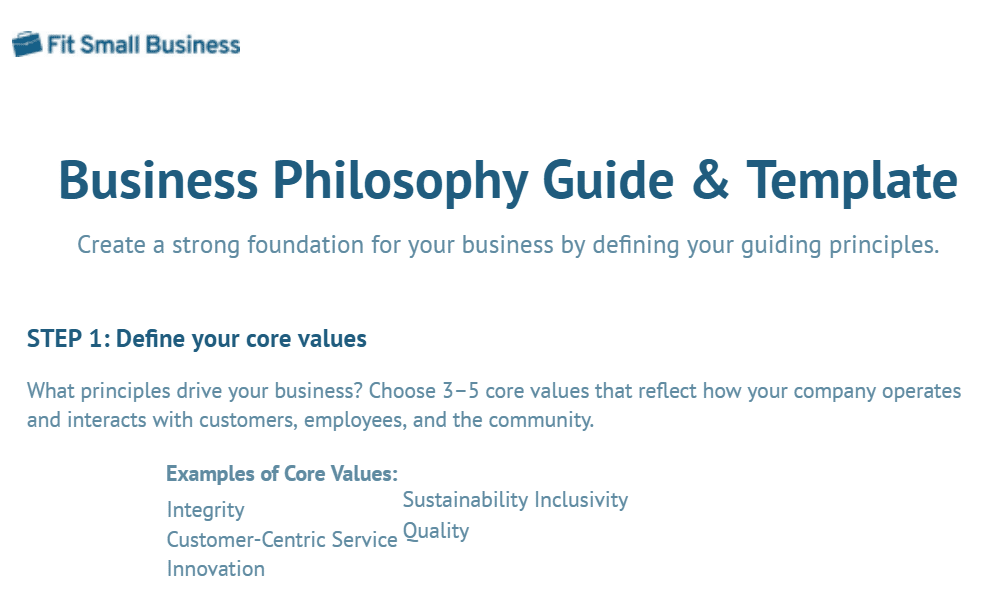A well-defined business philosophy can guide decision-making, inspire employees, and connect with customers. Here’s how successful businesses shape their philosophies — and how you can craft yours.
Key Business Philosophy Examples to Guide Growth
This article is part of a larger series on Starting a Business.
A business philosophy is the core set of beliefs that guides how a company operates, makes decisions, and interacts with customers, employees, and the community. It defines what your business stands for beyond just making a profit.
For example, Apple prioritizes innovation and simplicity, Patagonia is committed to environmental responsibility, and Zappos is all about exceptional customer service. These philosophies shape everything from product design to company culture and marketing strategies.
We put together 30 strong business philosophy examples — past and present — from Fortune 500 and other well-known companies to inspire you to write your own. Some group their values and call it philosophy, while others frame their philosophy in terms of a mission statement, values statement, code of conduct, or code of ethics.
1. Amazon: Customer obsession, innovation, and long-term excellence

Source: Amazon
2. Apple: Innovation, responsibility, and empowerment

Source: Apple
Apple isn’t just about making sleek gadgets — it’s about using innovation to make a real impact. The company believes that technology should empower people, connect communities, and drive positive change. Whether it’s prioritizing user privacy, designing for accessibility, or pushing for sustainability, Apple weaves its values into everything it creates. From the way its products are made to how it treats people and the planet, Apple aims to prove that business can be both groundbreaking and a force for good.
3. AT&T: Creating connection

Source: AT&T
AT&T, the world’s largest communications company, unifies its diverse services — cellular, web connectivity, and entertainment — under a simple yet powerful concept: connection. More than just utilities, AT&T’s philosophy centers on bringing people together, fostering meaningful experiences, and enriching lives. This vision not only shapes its services but also inspires employees to create deeper, more human-centered connections.
4. Atlassian: 5 Constant values
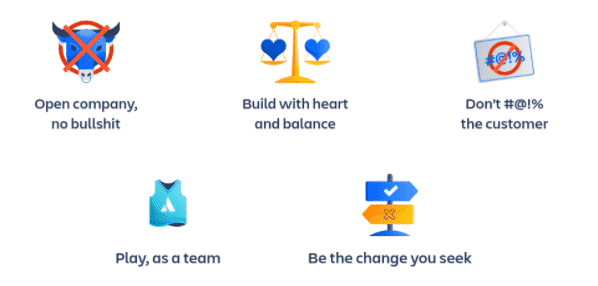
Source: Atlassian
5. Bank of America: Discipline, empathy, and understanding

Source: Bank of America
Bank of America’s philosophy is deeply customer-focused, emphasizing discipline, empathy, and understanding in every interaction. While its approach prioritizes customer satisfaction, it remains grounded in the financial industry’s core objective — delivering value to shareholders. This balance between customer-centric service and financial responsibility defines its long-term strategy.
6. Chevron: Innovating energy solutions for human progress
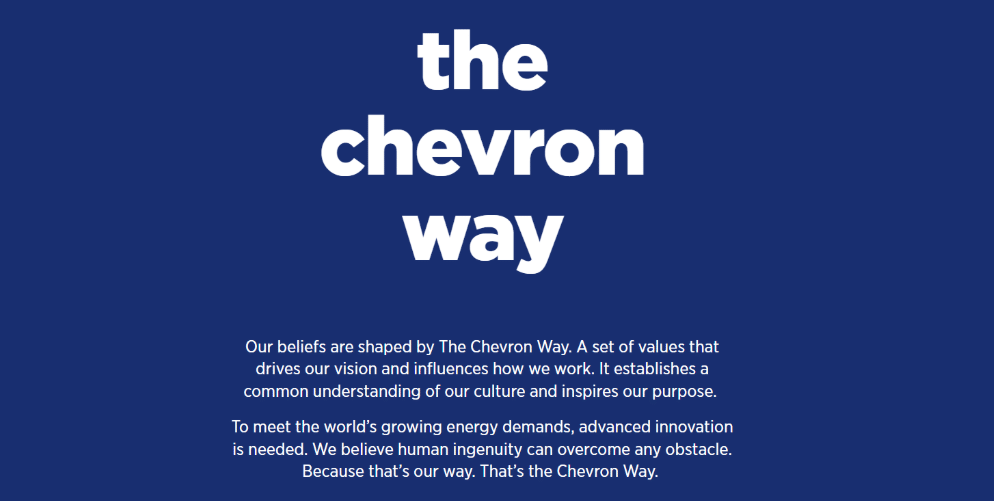
Source: Chevron
Also known as “The Chevron Way,” Chevron’s company philosophy is built on people, partnership, and performance, guiding how the company operates, innovates, and meets the world’s energy needs. It emphasizes human ingenuity, environmental responsibility, and industry leadership, striving to develop affordable, reliable, and ever-cleaner energy to drive human progress.
The Chevron Way philosophy ensures that these values remain at the core of the company’s decisions, from safety and sustainability efforts to fostering strong relationships with employees and communities. Since its early days, Chevron has upheld a commitment to integrity, safety, and collaboration, reinforcing its role as a leader in the energy industry.
7. Delta Airlines: Connection, equity, sustainability

Source: Delta Airlines
Delta Airlines’ business philosophy revolves around connection, equity, and sustainability. More than just an airline, Delta aims to connect people to opportunities while fostering a diverse, inclusive, and equitable work environment. The company is also committed to sustainable travel, with a goal of achieving net-zero carbon emissions by 2050. Through community engagement and responsible innovation, Delta strives to make travel more meaningful, accessible, and environmentally conscious.
8. Dove: Redefining beauty, empowering confidence
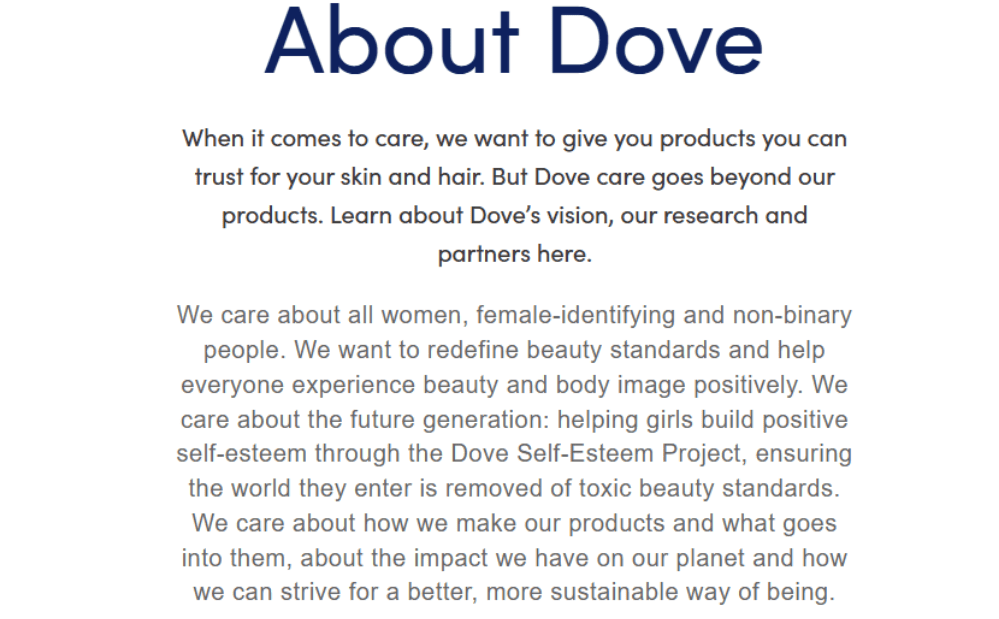
Source: Dove
Dove’s business philosophy is all about redefining beauty and building confidence. It challenges unrealistic beauty standards and pushes for self-acceptance, inclusivity, and a positive body image. With initiatives like the Dove Self-Esteem Project, Dove aims to give young people the tools to feel good about themselves.
And this ethos goes beyond just people — the company also focuses on sustainability and ethical products, making sure its impact is good for both consumers and the planet. By championing real beauty and self-love, Dove keeps inspiring a more confident and inclusive world.
9. FedEx: People, service, profit

Source: FedEx
Having invented a catchy and memorable acronym for its business philosophy, FedEx balances its operations on a trifecta of People, Service, and Profit. According to FedEx’s philosophy, these items are interrelated and not independent of each other. By fostering an exemplary working environment, employees will deliver a superior service, which then results in comfortable profit for the organization. Instead of focusing on money first, FedEx purports to prioritize employee satisfaction, assuming the rest will come. So far, this philosophy appears to be working.
10. Google: 10 Things we know to be true

- Focus on the user and all else will follow.
- It’s best to do one thing really, really well.
- Fast is better than slow.
- Democracy on the web works.
- You don’t need to be at your desk to need an answer.
- You can make money without doing evil.
- There’s always more information out there.
- The need for information crosses all borders.
- You can be serious without a suit.
- Great just isn’t good enough.
There are a lot of components to dissect in Google’s “10 Things” philosophy. But the thrust of the entire bit is making room for employees to explore, experiment, and succeed. It’s a very human-centric company with an employee-focused culture, trailblazing a creative, innovative, and play-focused work environment. Google has consistently been included in Comparably’s list of the best global workplace cultures since 2017, securing the top spot in both 2020 and 2021.
11. Home Depot: People, service, integrity
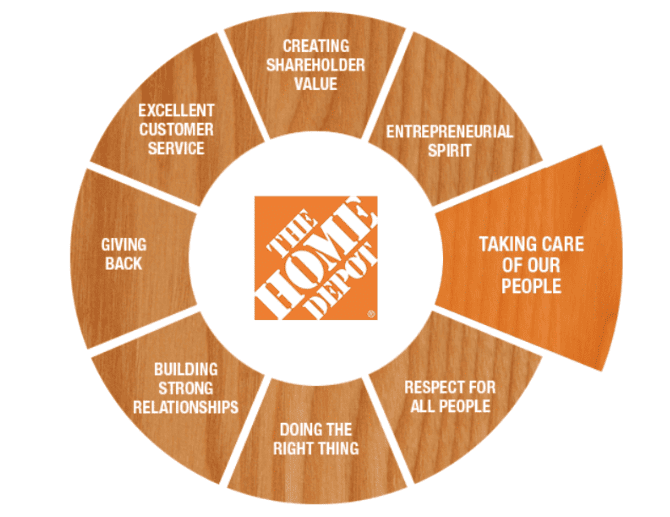
Source: The Home Depot
The Home Depot’s business philosophy is built on people, service, and integrity. The company prioritizes taking care of its employees, fostering an entrepreneurial spirit, and delivering exceptional customer service. Strong relationships — with customers, employees, and communities — are at the core of its values, alongside a commitment to giving back and doing the right thing. By upholding respect, integrity, and a focus on long-term growth, The Home Depot has built a brand that thrives on both business success and community impact.
12. HP: The HP Way

Another original company philosophy that started with the founders, “The HP Way” emphasized not what the company does or why, but how — with uncompromising integrity, respect, and trust, as well as flexibility and innovation. This is one of the few business philosophies discussed here that even mentions teamwork and the nurturing of team and collective successes rather than individual and company successes. In a highly independent society, it’s interesting that so few companies mention the importance of teamwork and team success to the overall achievement of the organization.
13. JPMorgan Chase: Integrity, excellence, inclusive growth

Source: JPMorgan Chase
JPMorgan Chase’s company philosophy is all about integrity, excellence, and inclusive growth — and it’s what keeps the company strong. The company focuses on serving clients well, making smart decisions, and leading with ethics, which helps build trust with customers, investors, and employees.
It also emphasizes equity and inclusion, making financial opportunities more accessible to more people. By staying disciplined and future-focused, the business stays resilient and adaptable, proving that success isn’t just about profits — it’s about long-term impact and responsible growth.
14. Kellogg’s: Integrity, passion, accountability
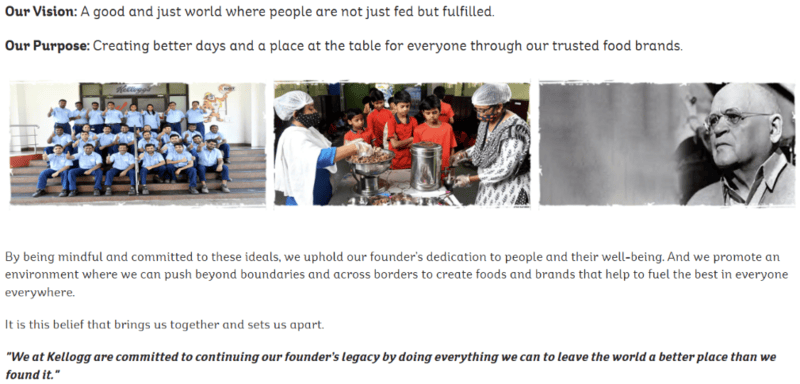
Source: Kellogg’s
Kellogg’s business philosophy is all about doing the right thing, staying passionate, and taking responsibility. The company believes in acting with integrity, valuing people, and continuously improving, which creates a culture where ideas thrive and teams succeed. It also focuses on simplicity and results, cutting through complexity to get things done while celebrating wins along the way. By fostering a positive, accountable, and innovative environment, Kellogg’s keeps its brands strong and its people motivated, ensuring long-term success for both the company and its customers.
15. LEGO: Creativity, learning, play

LEGO believes play is the foundation of creativity and learning. Their philosophy centers on imagination, curiosity, and hands-on exploration, helping children and adults build, experiment, and innovate. Every LEGO brick encourages problem-solving, collaboration, and limitless creativity, making learning fun and engaging. A deep commitment to quality and care ensures that LEGO provides not just toys but tools for growth and discovery, inspiring generations to dream, build, and achieve.
16. Lululemon: Curiosity

Source: Lululemon
Lululemon’s business philosophy offers a refreshing new concept among its peers: curiosity. However, Lululemon does insert the common theme of innovation into its approach. The company’s overall mission, it seems, is to utilize its product offering to “elevate the world” with better, more functional clothing. It may be a bit of a stretch, but this yoga-focused clothing line is obviously on to something nonetheless.
17. Microsoft: Respect, integrity, accountability

Source: Microsoft
Microsoft believes technology should help people do more, not limit them. Its philosophy centers on empowering individuals and businesses, pushing innovation forward, and ensuring technology benefits everyone. A strong culture of respect, integrity, and accountability keeps Microsoft focused on creating ethical and inclusive solutions. Big opportunities come with great responsibility, and Microsoft stays committed to shaping a future where progress works for everyone.
18. Nike: Focus on innovation
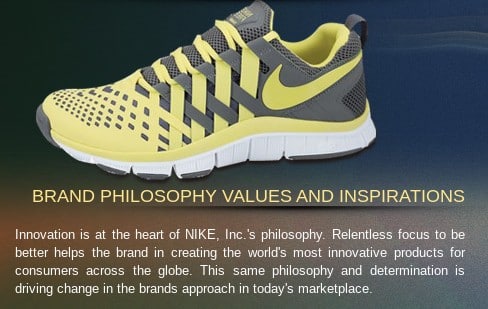
Source: Nike
Read through Nike’s “About” page on its website, and you’ll likely notice an oft-repeated word: innovation. Innovation is proudly woven into Nike’s DNA. So much so that it has taken to calling itself a tech company. It’s hard to argue with this assertion when Nike pioneered true footwear technology, including the Nike Flywire support system, Lunarlite foam cushioning, Hyperdunk basketball shoes, Free footwear, and the new Trainer 1 shoe. This is a clear example of a company truly living its company philosophy.
19. Nordstrom: Exceptional service, evolving style

Source: Nordstrom
Nordstrom believes fashion is more than just clothing — it’s self-expression and experience. Its philosophy centers on delivering the best possible shopping experience, whether in-store or online, and constantly evolving to meet customer needs. A commitment to outstanding service, quality, and innovation has driven the company for over a century, turning a small Seattle shoe shop into a leading fashion retailer. Trends change, and so does shopping, but Nordstrom’s focus on happy customers and great service stays the same.
20. Salesforce: Trust, innovation, impact
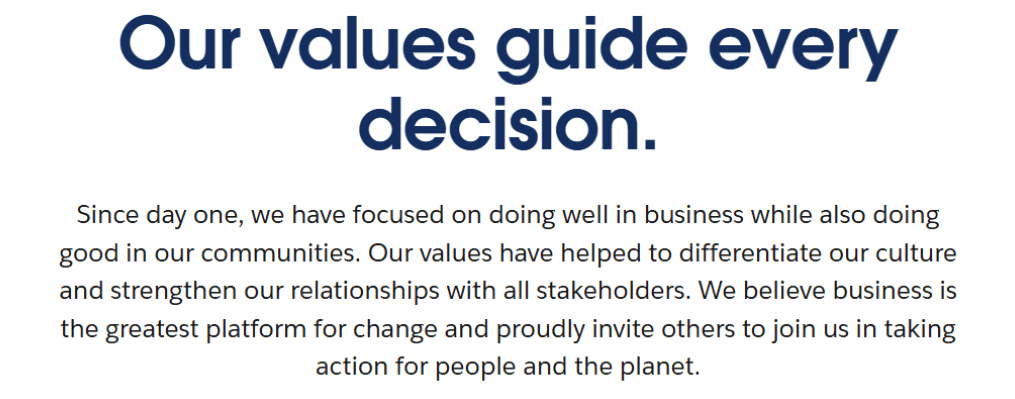
Source: Salesforce
Salesforce believes business is the greatest platform for change. Its philosophy focuses on building trust, driving innovation, and creating a positive impact for customers, communities, and the planet. A commitment to customer success, equality, and sustainability keeps them focused on making technology that helps businesses grow while fostering a more inclusive and connected world. Staying true to its values has made Salesforce a leader in both business and social responsibility.
21. Southwest Airlines: People, service, fun

Source: Southwest Airlines
Southwest Airlines believes success starts with people — both employees and customers. Its philosophy focuses on teamwork, honesty, and service with heart, creating a culture where employees feel valued and customers feel welcome. Efficiency and discipline keep operations smooth, while a “Fun-LUVing” attitude makes flying enjoyable. By staying affordable, reliable, and customer-focused, Southwest aims to be an airline people love to fly.
22. Square: Empowering business through innovation

Source: Square
Square believes every business — big or small — deserves the tools to thrive in a changing economy. Its philosophy focuses on innovation, accessibility, and efficiency, making it easier for entrepreneurs to sell, manage, and grow. By constantly evolving beyond payments, Square provides an all-in-one platform that unlocks opportunities and streamlines operations. A commitment to collaboration and learning keeps Square at the forefront of business technology, helping sellers succeed in a digital world.
23. Starbucks: Employee first philosophy

Brand Autopsy explored Starbucks’ Employee First Philosophy, which actually came from a 1986 memo from Il Giornale Coffee Company (the company that purchased Starbucks in 1987). Even then, former CEO Howard Schultz preached the importance of Steve Jobs’ subsequent management philosophy, “I hire people smarter than me and get out of the way.” Nurturing the human resources behind the product is a philosophy older than Starbucks itself, and one that has only recently begun to catch on elsewhere.
24. TOMS: One-for-one

Source: TOMS
This philosophy of giving is called the One-for-One philosophy. And it became so much more than a philosophy in the wake of TOMS’ philanthropic approach; it formed the foundation for a new social enterprise business model. This was a trailblazing concept when TOMS pioneered it in 2006, and countless companies have since incorporated giving into their business models, including Bombas, Warby Parker, and Wildflower & Oak.
25. Trader Joe’s: Value, adventure, community

Source: Trader Joe’s
Trader Joe’s makes grocery shopping affordable, fun, and unique. The company focuses on everyday low prices by buying directly from suppliers and eliminating extra costs. Stores offer a welcoming, neighborhood feel, where friendly staff, creative signage, and a rotating selection of products make shopping an adventure. A commitment to quality, value, and discovery keeps customers engaged and excited to return.
26. Walgreens: Health, innovation, connection
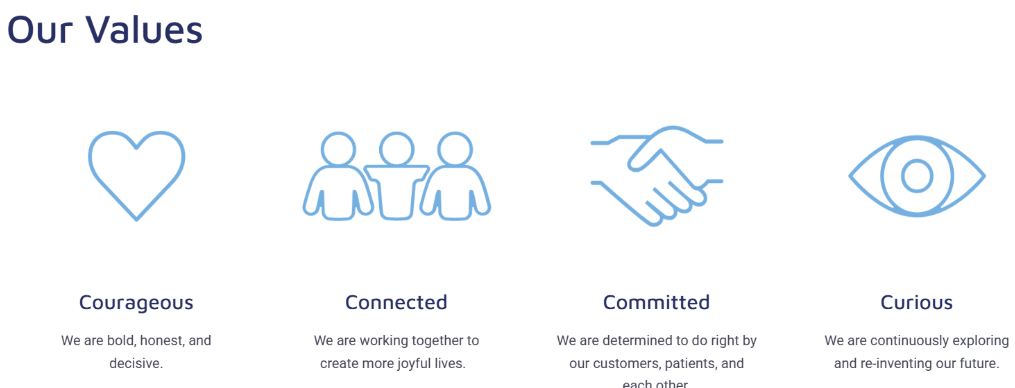
Source: Walgreens
Walgreens is committed to helping people live healthier, more joyful lives. The company focuses on reimagining local healthcare, making wellness more accessible through innovation, trust, and community partnerships. A strong culture of courage, curiosity, and commitment drives its approach to customer care, ensuring patients receive the support they need. Health services and a customer-first mindset work together to make Walgreens a trusted healthcare partner.
27. Walmart: Better, stronger, more sustainable

Source: Walmart
Walmart believes in making life better for customers, employees, and communities. With stores within 10 miles of 90% of the US population, the company focuses on affordable, accessible, and sustainable products to improve daily living. A strong commitment to workplace growth, fair wages, and skill development ensures that employees have opportunities to succeed.
Community impact remains a priority, with US job creation, disaster relief, and sustainability initiatives strengthening local economies. Guided by ethics, integrity, and innovation, Walmart continues to shape responsible retail that benefits both people and the planet.
28. Wegmans: People-first, community-focused, and committed to quality.

Source: Wegmans
Wegmans believes great food starts with happy employees and strong communities. The company puts people first, creating a workplace where employees feel valued, empowered, and supported. A culture of inclusion, sustainability, and giving back drives everything it does, ensuring that customers, employees, and local communities thrive together. High standards and a passion for quality food define the Wegmans experience, making every shopping trip about more than just groceries — it’s about health, connection, and making a difference.
29. Zappos: Service, culture, and WOW

Source: Zappos
Zappos isn’t just about selling shoes — it’s about delivering happiness. The company’s philosophy centers on exceptional customer service, a strong company culture, and a deep sense of community. Every interaction is designed to WOW customers, employees, and partners, creating an experience that goes beyond retail.
A commitment to kindness, innovation, and customer obsession drives Zappos to keep evolving while staying true to its core values. Service isn’t just part of the business — it is the business.
30. 3M: Science, innovation, and impact

3M believes in using science to solve real problems and make life better. Collaboration and innovation drive the company’s success, leading to practical solutions that improve industries and communities. A strong ethical foundation ensures 3M operates responsibly, balancing business growth with environmental and social impact.
How to develop a strong business philosophy
A great business philosophy isn’t just words — it’s a guiding force that shapes decisions, culture, and customer relationships. Here’s how to build one that truly defines your brand.
Step 1: Identify your core values
What does your company stand for? Your core values should reflect what matters most to your business and how you want to impact the world. Walmart, for example, built its philosophy around affordability and accessibility, ensuring customers get the best prices while also supporting communities. Choose values that align with your brand’s mission and resonate with your audience.
Step 2: Define how you serve customers
A company philosophy should clearly outline how you create value for your customers. Apple, for instance, prioritizes user experience, designing products that are simple, intuitive, and beautifully crafted. Think about what sets your business apart and how your approach benefits your customers in a meaningful way.
Step 3: Align your philosophy with company culture
A strong philosophy isn’t just external — it should shape your internal culture, too. Zappos, known for its customer-first mindset, empowers employees to go above and beyond for customers, creating a culture that prioritizes service. When your philosophy aligns with how your team operates, it becomes an integral part of daily decision-making.
Step 4: Communicate and reinforce it
A business philosophy only works if people know it, believe in it, and live by it. Share it with employees, integrate it into training, and weave it into marketing and customer interactions. Whether it’s on your website, in team meetings, or as part of your branding, make sure your philosophy is clear, consistent, and reinforced at every level.
Bonus: Business philosophy guide & template
Need a clear, impactful business philosophy? This quick, actionable template helps you define your values, refine your purpose, and align your company culture. Download now to create a philosophy that inspires, connects, and drives success!
Frequently asked questions (FAQs)
Read answers to common questions on business philosophy below:
A mission statement defines what a business does and its core purpose, while a business philosophy outlines how it operates, including its values, principles, and approach to decision-making. The mission is the goal, and the philosophy is the mindset and approach behind it.
Yes! A business philosophy can evolve as a company grows, adapts to market changes, or refines its values. While core principles often stay the same, the way they’re applied may shift to stay relevant and aligned with new goals.
A business philosophy shapes company culture by setting the tone for values, behaviors, and decision-making. It influences how employees interact, the work environment, and customer relationships. A strong philosophy fosters alignment, motivation, and a shared sense of purpose, creating a more engaged and cohesive team.
Bottom line
Creating a company philosophy is all well and good. But the point isn’t just to have a static, decorative philosophy to put on the shelf. The philosophy should be action-oriented and guide the conscience of the business, regardless of format or length.
A well-crafted business philosophy builds trust, strengthens brand identity, and keeps your company focused on what matters most. Define it, live it, and let it guide your success.

